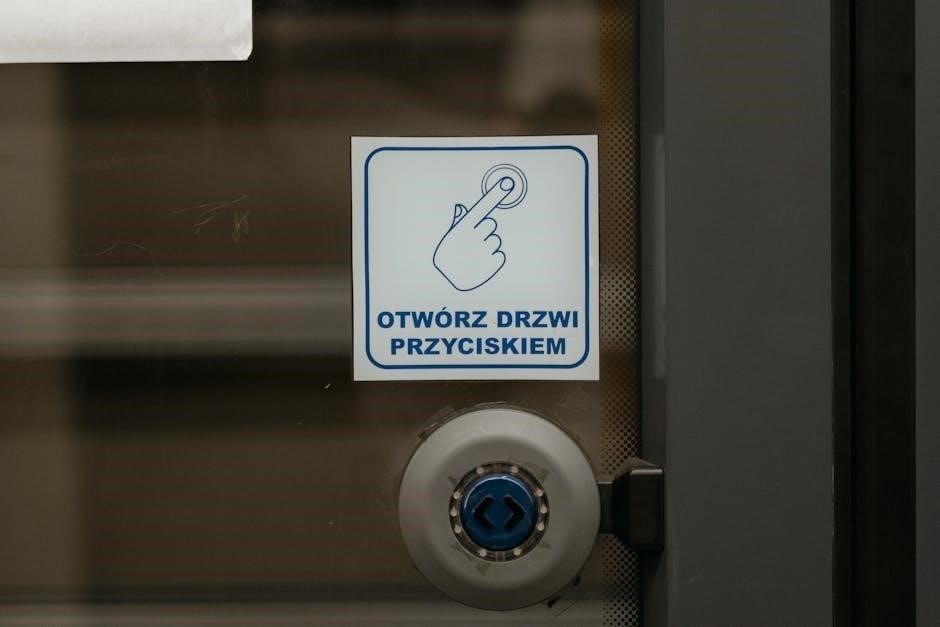This manual serves as a comprehensive guide for using Digital Signature Certificates (DSC) in patent applications‚ ensuring secure and authentic electronic submissions. It outlines the transition from traditional physical signatures to digital authentication‚ enhancing efficiency and compliance in legal filings.
What is a Digital Signature Certificate (DSC)?
A Digital Signature Certificate (DSC) is an electronic equivalent of a physical certificate‚ used to authenticate the identity of individuals or organizations online. It contains public-key encryption details and is issued by a Certifying Authority (CA). DSCs are essential for secure digital transactions‚ including e-filing of patent applications. They ensure the authenticity and integrity of documents‚ preventing tampering. In India‚ Class 3 DSCs are mandated for legal filings like patents and trademarks‚ as they offer the highest level of security. The certificate is stored on a USB token and requires a private key for signing‚ ensuring only authorized users can execute digital signatures.
Importance of DSC in Patent Applications
A Digital Signature Certificate (DSC) is crucial for secure and authentic electronic submissions in patent applications. It ensures the integrity and legality of documents‚ preventing tampering and fraud. Legally admissible under the IT Act‚ 2000‚ DSCs validate the identity of applicants‚ making them indispensable for e-filing. They streamline the patent filing process‚ reducing paperwork and delays. DSCs also comply with Patent Office requirements‚ ensuring applications are processed efficiently. By providing a secure digital authentication method‚ DSCs enhance trust and transparency in intellectual property filings‚ making them essential for modern patent applications.

Eligibility Criteria for DSC in Patent Applications
Applicants must hold a valid Class 3 Digital Signature Certificate (DSC) for electronic patent submissions‚ ensuring authenticity and compliance with legal requirements.
Who Can Apply for a DSC?
Individuals‚ businesses‚ and organizations can apply for a Digital Signature Certificate (DSC) to authenticate patent applications digitally. Applicants include inventors‚ patent attorneys‚ and company representatives. The DSC must be obtained in the name of the individual or organization filing the patent. Class 3 DSC is mandatory for patent applications‚ ensuring legal compliance and secure submissions. The certificate is issued to valid applicants after verifying their identity and documents. This process ensures that only authorized entities can sign and submit patent applications electronically‚ maintaining the integrity and security of the filing process.
Required Documents for DSC Application
To apply for a Digital Signature Certificate (DSC)‚ specific documents are required to verify identity and authentication. These include a valid photo ID proof (e.g.‚ Aadhaar‚ PAN‚ or passport)‚ address proof (e.g.‚ utility bills or bank statements)‚ and a recent passport-sized photograph. Additionally‚ a signed application form and self-attested copies of these documents are mandatory. For organizations‚ authorization letters and company-specific documents may also be needed. These documents ensure the legitimacy and authenticity of the DSC application‚ facilitating a smooth and compliant process for patent filings.

DSC Application Process for Patent Filing
The process involves selecting a certifying authority‚ submitting required documents‚ and completing verification. Post-approval‚ the DSC is issued‚ enabling secure digital signing for patent applications.
Step-by-Step Guide to Obtaining a DSC
Choose a certified authority like eMudhra or Capricorn for DSC issuance. 2. Gather required documents‚ including ID and address proof. 3. Fill the DSC application form online. 4. Submit the form along with self-attested documents. 5. Complete the verification process‚ which may include Aadhaar-based authentication or video KYC. 6. Once verified‚ the DSC is issued via email or USB token. 7. Install the DSC on your system for seamless digital signing. This process ensures secure and efficient patent application submissions‚ adhering to legal requirements.
Cost and Duration of DSC
The cost of obtaining a Digital Signature Certificate (DSC) typically ranges between INR 700 to INR 2500‚ depending on the validity period and service provider. The usual validity periods are 1‚ 2‚ or 3 years. The issuance process generally takes 1-3 working days after submitting the required documents and completing verification. Renewal costs are similar to the initial application. Payments can be made online via various secure modes. Ensure to choose a certified authority for compliance and security. This streamlined process ensures quick and cost-effective digital authentication for patent applications.

Installing and Setting Up DSC
Ensure your system meets requirements like Windows 7/8/10‚ 1GB RAM‚ and internet connectivity. Install the DSC software‚ insert the USB token‚ and configure the smart card reader. Download drivers and follow on-screen instructions for setup. Ensure the token is recognized by the system and test the signature functionality before use.
System Requirements for DSC Installation
To install and use a Digital Signature Certificate (DSC)‚ your system must meet specific requirements. Ensure you have a compatible operating system such as Windows 7‚ 8‚ 8.1‚ or 10 (32-bit or 64-bit). A minimum of 1GB RAM is recommended for smooth operation. Additionally‚ you need at least 50MB of free disk space for the software installation. A USB port is essential for the DSC token‚ and internet connectivity is required for certificate activation. Ensure your browser is updated to the latest version for compatibility. These specifications ensure the DSC software functions optimally for patent application submissions.
Installation and Configuration Process
After meeting the system requirements‚ begin by inserting the DSC token into a USB port. Download the latest driver and software from the Certificate Authority’s website. Run the setup file‚ following on-screen instructions to install the necessary tools. Once installed‚ plug in the token and ensure the system recognizes it. Open the software‚ enter your credentials‚ and complete the activation process. Configure the token settings as per your organization’s requirements. Test the DSC by signing a sample document to ensure functionality. Proper configuration ensures seamless integration with patent application platforms‚ enabling secure digital submissions.
Signing a Patent Application with DSC
Using a Class 3 Digital Signature Certificate (DSC)‚ applicants can securely sign patent documents‚ ensuring authenticity and compliance with legal requirements under the IT Act‚ 2000.
Step-by-Step Process for Digital Signing
- Prepare your patent application documents in the required format.
- Plug in your DSC token and install the necessary drivers.
- Log in to the patent filing portal using your credentials.
- Upload the prepared documents to the portal.
- Select the “Sign with DSC” option and choose your certificate.
- Enter the DSC token PIN when prompted.
- Review the signed document and submit it.
This process ensures secure and legally valid digital signing of patent applications.
Troubleshooting Common Issues
Common issues during DSC usage include Java errors‚ token detection problems‚ and certificate expiration. Ensure your system meets the required specifications and install updated Java versions. If the DSC token isn’t recognized‚ reinstall drivers or check USB port functionality. Expired certificates must be renewed before use. Browser compatibility issues can be resolved by switching to supported browsers like Chrome or Firefox; For PIN errors‚ retry entering the PIN carefully or reset it if necessary. Regularly update your DSC software to avoid technical glitches. Consulting official guides or contacting support can help resolve persistent problems efficiently.
Legal and Compliance Aspects
Digital signatures are legally valid under India’s IT Act‚ 2000‚ ensuring authenticity and compliance in patent applications. DSCs must meet Patent Office requirements for secure submissions.
Legal Validity of Digital Signatures in India
In India‚ digital signatures are legally recognized under the Information Technology Act‚ 2000‚ making them admissible in court. This legal framework ensures the authenticity and integrity of electronic documents‚ including patent applications. The Controller General of Patents‚ Designs‚ and Trademarks mandates the use of Class 3 Digital Signature Certificates (DSC) for secure and compliant e-filing. This certification is essential for maintaining the legal validity of patent submissions‚ as it verifies the signer’s identity and ensures document integrity. The IT Act‚ 2000‚ provides the necessary legal backing‚ ensuring that digitally signed documents hold the same weight as physically signed ones in legal proceedings.
Compliance with Patent Office Requirements
For patent applications in India‚ compliance with the Controller General of Patents‚ Designs‚ and Trademarks (CGPDTM) requirements is mandatory. The Patent Office strictly requires the use of a Class 3 Digital Signature Certificate (DSC) for secure e-filing. Applicants must register on the CGPDTM portal and ensure their DSC is validated for authenticity. Documents submitted must adhere to specified formats‚ such as PDF‚ and include the digital signature to confirm the applicant’s identity. Failure to comply with these guidelines may result in delays or rejection of the application. Proper adherence ensures smooth processing and maintains the integrity of the patent filing system.

DSC Renewal Process
The DSC renewal process involves submitting required documents and fees before expiration to maintain validity. It ensures continued secure digital signing for patent applications.
When and How to Renew Your DSC
A DSC typically remains valid for 2-3 years‚ after which renewal is required. Renewal ensures uninterrupted use of digital signatures for patent applications. The process involves submitting identification and address proof‚ along with the renewal fee. Applicants can renew their DSC before the expiration date to avoid any disruption. The renewed certificate is issued upon verification of documents and payment. Existing DSCs can be used for patent applications until expiration‚ but renewal is mandatory for continued digital signing. Ensure timely renewal to maintain compliance and seamless electronic filing of patent documents.
Validity Period of DSC
A Digital Signature Certificate (DSC) is generally valid for 2 to 3 years from the date of issuance. This period ensures the certificate remains secure and up-to-date with evolving cryptographic standards. The validity begins from the date of issuance and expires thereafter‚ requiring renewal for continued use. During this period‚ the DSC can be used for multiple patent applications‚ provided it remains valid. Once expired‚ the certificate cannot be used for digital signings‚ and renewal is mandatory to maintain legal admissibility. Proper tracking of the validity period is essential to avoid disruptions in patent filing processes. Always verify the expiration date before using the DSC for critical applications.
Best Practices for Using DSC
To ensure secure and efficient use of DSC‚ always safeguard your digital signature‚ keep software updated‚ use it only for authorized purposes‚ regularly check validity‚ and comply with legal standards.
Safeguarding Your Digital Signature
Safeguarding your Digital Signature Certificate (DSC) is crucial to prevent unauthorized access and ensure legal compliance. Always store the DSC token in a secure location‚ use strong passwords‚ and avoid sharing credentials. Regularly monitor for unauthorized use and revoke access immediately if compromised. Keep your software updated to protect against security vulnerabilities. Use biometric authentication if available and ensure your device is free from malware. Never use public computers for signing documents. Maintain backup procedures to avoid loss of access. Adhere to legal guidelines and organizational policies to ensure the integrity and security of your digital signature.
Regular Updates and Maintenance
Regular updates and maintenance of your Digital Signature Certificate (DSC) are essential for seamless functionality and security. Ensure your DSC software and drivers are updated to the latest versions to avoid compatibility issues. Periodically check for firmware updates for the DSC token and install them promptly. Maintain your system’s operating system and security software to protect against vulnerabilities. Regularly back up your DSC to prevent data loss in case of hardware failure. Additionally‚ verify the expiration date of your DSC and renew it before it lapses to maintain uninterrupted use. Consistent maintenance ensures your digital signature remains valid and secure for all patent applications.
This manual provides a detailed guide on using Digital Signature Certificates for patent applications‚ ensuring secure and efficient electronic submissions. It highlights the importance of DSC in modern patent filing processes.
The DSC Patent Application Sign Manual provides a comprehensive guide for using Digital Signature Certificates in patent applications. It highlights the importance of DSC for secure and authentic electronic submissions‚ as mandated by legal requirements. The manual outlines eligibility criteria‚ required documents‚ and step-by-step processes for obtaining and using DSC. It also covers installation‚ configuration‚ and troubleshooting common issues. Legal compliance and best practices for safeguarding digital signatures are emphasized. The manual serves as an essential resource for individuals and organizations seeking to streamline patent filing processes efficiently and securely‚ ensuring adherence to regulatory standards and minimizing errors.
Future of DSC in Patent Applications
The future of DSC in patent applications lies in advancing technological integration and enhanced security. With rising digital transformation‚ DSCs are expected to become more seamless and universally adopted for intellectual property filings. Blockchain technology may further secure digital signatures‚ ensuring tamper-proof authentication. AI-driven systems could streamline DSC issuance and verification processes‚ reducing errors and delays. Additionally‚ the adoption of quantum-resistant algorithms may emerge to safeguard against future threats. As global patent systems evolve‚ DSCs will likely become a standard requirement‚ fostering efficiency and trust in international filings. These advancements promise to make patent applications more secure‚ efficient‚ and accessible worldwide.

